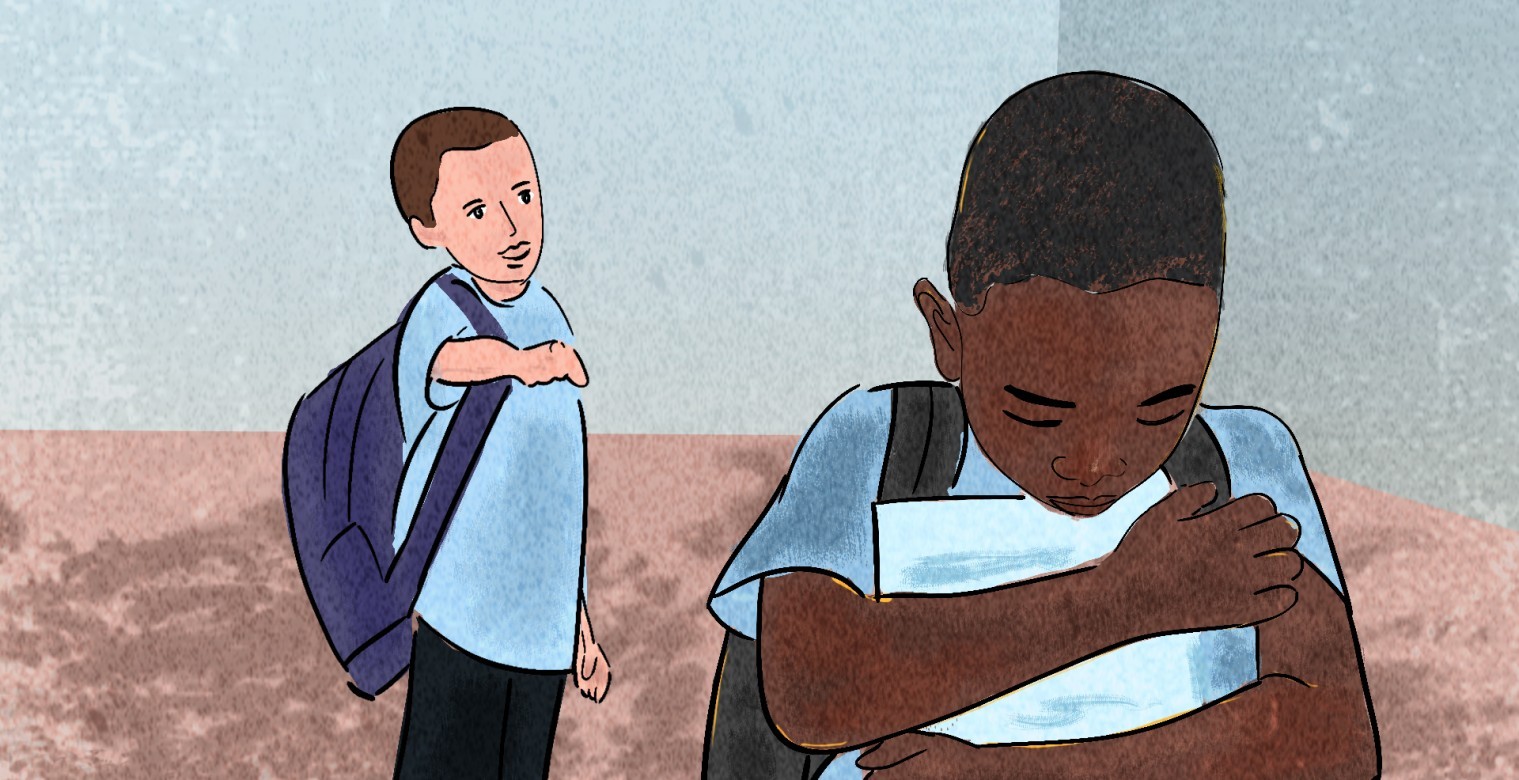In many moments, children practice unacceptable behaviors towards each other, which may be acquired from the surrounding environment and the society around them without feeling the magnitude of the harm they cause to someone, and one such behavior is bullying, which can take various forms, particularly when it is based on skin color.
In the classroom environment within schools or the community environment in general, black children experience various forms of bullying due to the color of their skin, including ridicule, ostracism, and stigmatizing terms such as "slave, ugly, kocha" and others, which is accompanied by serious psychological problems, according to some of them, that make them fight to get rid of them over the years.
Marwa Ahmed, a pseudonym, (18 years old), was the most difficult period of primary school for herself, she says: "When I was in the fourth grade, my classmates used to make fun of me because of the color of my skin, and when I tried to approach one of them during the school break, they threw empty bags of chips at me and I heard ugly and ugly words from them."
One day, the teacher forced Marwa to sit next to a white colleague, but the latter did not stop mocking Marwa and even put a barrier separating them, and Marwa did not realize the effects of these behaviors practiced against her until she reached the sixth grade of primary school and showed psychological effects and disorders as a result of what she experiences daily from her colleagues.
Little did she know how to cope with so much bullying, which left her in the wind in front of young bullies for years, which raises the question of the role of educational counseling in schools towards these cases.
The educational counselor Islam Al-Sayed answers their efforts in schools towards bullying: "We deal with both cases, whether the child who is bullied or the child who causes it, and we need a lot of time to train the bullying child to control his emotions."
Al-Sayed said: "There are actions in which we start with emotional training and then self-training, and we train the child to face bullying strongly without showing signs of anger and annoyance, guiding the person in front of him the euphoria of victory and pushing him to persist in his behavior, and this awareness is of great importance to change the child's behaviors and the growth of his healthy and non-fragile personality."
What Al-Sayed said intersected with what was clearly shown in the case of Marwa, who no longer cares about this matter in high school, as she became more aware and was able to develop her abilities, and she worked hard to get first place in the class; this helps her to be respected more by her colleagues and less bullying.
In a study entitled "Family Climate and its Relationship to Bullying and Mental Health among Adolescent School Students in the Gaza Strip", researcher Latifa Shatat confirms that the average scores of bullying in this group reached (24.40%).
The study evaluated this score as somewhat low, according to a statistical sample conducted on (941) adolescent students in public schools in the Gaza Strip during the academic year (2020-2021).
These results are consistent with what the head of mental health at the Ministry of Education, Abeer Al-Shorafa, explained that they in the ministry pay great attention to the phenomenon of bullying, and they had launched the "No to Bullying" campaign in all schools, which is part of the unified plan of the educational counselor in every school in the Gaza Strip.
Al-Shorafa said in an interview with "Last Story": "In this awareness campaign, we use the definition of bullying, its forms, causes, and manifestations, as we work to educate teachers and students alike, and the campaign also includes parents who are given great importance to guide them about the nature of the phenomenon and how to recognize that their child is being bullied and then deal with it appropriately".
Parental participation in the anti-bullying campaign has varied. For example, Tim's mother (not her real name) attended the campaign after noticing that her 10-year-old child was reluctant to go to school.
The mother didn't know why her son didn't want to go to school, and thought it was just neglect from her child. She didn't realize that the case might be bigger than that, and soon discovered that he was being bullied because of his skinlessness from his classmates and refusing to go to school to escape the abuse he was subjected to.
Um taim said: "The thing that made things worse was that the teachers also treated Tim in the same way," whose mother had no choice but to build her son's personality alone by enhancing his self-confidence through workshops, awareness seminars, and exercises that helped him develop himself positively and face the school and society.
Will every child who experiences bullying be able to find the necessary support to overcome the resulting psychological difficulties? This question is particularly relevant in Palestine, where the concept of bullying is not legally defined or protected, as noted by lawyer Ziad Al-Jourani."
According to Al-Jourani, Palestinian law does not provide any legal protection against bullying, and there have been no cases in which a defendant was convicted of bullying-related verbal or physical assault. It should be noted that the term 'bullying' is used internationally and not locally.
At a time when the concept of bullying is legally absent and the social incubator may be lacking to some extent, the weight falls on the psychological role to protect children from this phenomenon, as psychologist Samar Qwaider reported that the child issues psychological reactions if he notices that it is him unacceptable in his surroundings.
One common response exhibited by the child is to question why they were created with their particular skin color and how it affects their social and self-worth.
These questions that the child asks about his psychological problems begin to grow little by little, so he refuses to deal with this society and resorts to isolation and introversion, as it seems clear to him the lack of his friends, so it is important to integrate these children into the outside world and educate them about dealing with it.




